#qing dynasty meta
Text
ZevWarden Week 2022

What is it? A week (this year, September 4th - 10th) of creating new fan content, sharing it, and celebrating the wonderful relationships between your favourite Grey Warden(s) and Zevran Arainai.
How to participate: Feel free to follow the daily prompts as inspiration for whatever ZevWarden-related content your heart desires. Fics, art, meta discussions - everything goes! Remember to tag your works appropriately (ie. #nsfw or #zevistair) and most of all, have fun!
Prompts:
Sunday, September 4: Culture
Monday, September 5: Gold
Tuesday, September 6: Fights and Reconciliation
Wednesday, September 7: Alternate Universes
Thursday, September 8: Promises
Friday, September 9: Death
Saturday, September 10: Seasons
Like previous years, we took each prompt and gave it two different spins. Choose whichever inspires you, or take the base prompts in your own direction!
Tag your content with #zevwarden week 2022 or tag us on your post and we’ll reblog it here.
*Any art found to be whitewashing Zevran will not be shared.
Day 1 - Sunday, September 4 - Culture
Culture shock
"Now, if it is all the same to you, I would prefer not to speak more of Antiva. It makes me wistful and hungry for a proper meal."
What does Zevran think about life in Ferelden that we don't get to see in-game? If your Warden and Zevran ever travel anywhere else, what's familiar and what comes as a surprise?
Cultural exchange
"Loving a place is not the same as never desiring to be elsewhere."
Either at home or abroad, do the Warden and Zevran experience new foods, festivals, or traditions together? How do Zevran and the Warden deal with their cultural differences and similarities?
Day 2 - Monday, September 5 - Gold
Trinkets
"You do seem to stumble onto treasure on a regular basis, somehow."
Between the infamous earring and all the looting the Warden does over the course of the Blight, it’s easy for the pair of them to accumulate quite a few trinkets. Are there any things in particular they each collect? What kinds of things do they save for each other?
Money
"Ah, the bustle of a market district! The pickpocket's home away from home!"
We know a little bit about Zevran's relationship to money, but what about the Warden's? Do Zevran and the Warden have enough of it, post-Blight? Do they have more than they know what to do with? How do they make a living and how do they spend what they've got? Also fun for this prompt: stories about stealing or bartering.
Day 3 - Tuesday, September 6 - Fights and Reconciliation
Arguments
"You are a very frustrating person to deal with, do you know that?"
Do the Warden and Zevran ever fight, either verbally or with weapons? Perhaps your Warden or Zevran (or both) get into a disagreement with somebody else. How do they resolve it or fail to resolve it?
Kiss and make-up
"Running a bit hot and cold, are we? Fair enough. Let's get back to business."
What helps the Warden and Zevran deal with tension after a tough moment? Are they quick to forgive or does it take them a little longer to work things out? Do they prefer to work things out with conversation or more physically?
Day 4 - Wednesday, September 7 - Alternate Universes
Variations on DAO
"Taliesen offered to come to the ambush with me and I said, 'Taliesen, I don't need any help. This Grey Warden is a new recruit. How hard could it be?' But then, if I had been more open-minded to his help, either you would be dead or I would be. So it was better I refused. Huh."
What would happen if Zevran met your Warden before the contract? Does your Warden end the Blight in a way the game's endings don't allow? This version of the prompt is for reimagining the story of DAO in a new way.
Completely new setting
"I feel like we've just entered a Grand Cleric's bedchambers, where no one has gone before."
Got an idea for the characters as vampires, mermaids, or living in a painstakingly historically accurate Qing Dynasty, China? The crew playing D&D in a college AU? Go wild.
Day 5 - Thursday, September 8 - Promises
Promises kept
"In truth, for the chance to be by your side, I would storm the Dark City itself."
Which promises do Zevran and the Warden make to each other? How do they come to make those promises? Are there ever moments when there is a price to be paid for keeping a promise?
Promises broken
"What are promises? There are many kinds, spoken and unspoken, and yet we break them all the same, yes? They do not matter."
Do Zevran and the Warden ever break a promise made to each other? Why do they break it—is it for a good reason? How does the other party react?
Day 6 - Friday, September 9 - Death
Near-death experiences
"I landed in the river and nearly drowned. I was fished out by some urchins who robbed me blind. Made off with my boots, too. At least they didn't cut my throat."
Zevran and the Warden meet for the first time in a failed assassination attempt. Whether dramatic or humorous or some of both, Zevran and the Warden have had many brushes with death in their adventures. Share a moment from one of those times.
Laid to rest
"It's unfortunate, but death comes to us all. If not me, then some wasting disease. Or a fall down the stairs.Or at the hands of a darkspawn. It's all relative, in the end."
No one escapes death. This is the prompt to share a moment of triumph after a battle, complex feelings after a successful assassination, or offer a character a peaceful death at home.
Day 7 - Saturday, September 10 - Seaons
Seasons of the year
"In Antiva it rains often, but the flowers are always in bloom... or so the saying goes."
Do Zevran and the Warden celebrate holidays together? Which, and how? Does Zevran struggle with Fereldan winter, and the Warden with Antivan summer? What specific activities do they enjoy doing in each season?
Seasons of life
"It's true. I live a charmed life. One of the prostitutes that raised me was a fortune teller. Said I wouldn't die young. She was rather startled by that."
As characters hit new life milestones and grow older, what is a significant event that happens in their lives together? Did either of them expect or even wish for that milestone to happen in their life?
#zevwarden week 2022#zevwarden week#zevwarden#zevran x warden#zevran arainai#zevran#dragon age#dragon age origins#dragon age fanfiction#dragon age fanart#zevraholics anonymous
344 notes
·
View notes
Note
for the WIP game, weigh your shadow is intriguing me!
AH! This is a long running Naruto work -- and the third in a series called 'Six for Hell' that I have yet to complete, but basically it follows a version of Uchiha Tajima (very background character in the Warring Clans Era of Naruto) up until his death.
Six for Hell is an exploratory Naruto fic series that's also set in an early 20th Century China AU and follows the parallels between the Warring Clans Era/early Village Founding of Naruto and the chaos of the decades following the fall of the Qing Dynasty, the Warlord Era, the (brief) Republican Era and the Chinese Civil War.
This is what I wrote about the series as a whole when I started it in 2021:
So this fic series is a bit more experimental in nature than I had first set out to do, but “all this scarcity promotes” is the first of a series of six rather small fics, embodying six different povs over the span of roughly 42 years (from 1907 to 1949).
The early half of the 20th century was one of great upheaval and change in China, featuring the collapse of the last imperial dynasty, the rise of local warlordism, steady invasion from Japan and the West, conflicting centers of political thought, a bloody civil war, huge changes in art, literature, technology, and social structure, and vast, vast wealth and technological disparities between regions, people, and movements.
I am definitely no expert on the time period or what its impacts and reach has wrought on our current modernity, but it seems only fair to acknowledge that this fic series takes a lot of inspiration from the social and political changes that influenced the era, and that I see a lot of parallels between it and the canonical Warring Clans Era. What little we do see of that time period shows huge changes in social structure, political thought, and eventually, structure of government.
Which is all to say that this might be a bit too meta and too serious for what amounts to be, in the end, a Naruto fanfic, but hey, I thought it would be fun to mention if any readers ever wonder “from where has the author gotten all of these plot/setting details and or themes??”
In any case, welcome aboard. This is the world of “Six” — one filled with magical ninjas, societal collapse, invasion, battery powered flashlights, and an angry young man with his accidentally adopted weird kid.
:D thanks for the ask!
2 notes
·
View notes
Text
power dressing: aka, caiying fashion meta
before we start: i make use of a lot of pictures and references to fashion from the song, ming and qing dynasties through photography and dramas. i want to go ahead and preface this by saying that these are not 100% accurate of course and take quite a bit of artistic liberties with the outfits. i also know liyue isn't set in any particular era but i prefer to use historical references for this blog and any associated development ( i.e, character design, culture, etc )
daily wear: when thinking of what kind of style to dress caiying in, the type of styles that were popular during the ming dynasty. some fashion during that time incorporated the pleated skirts, larger sleeves and longer pieces of clothing.

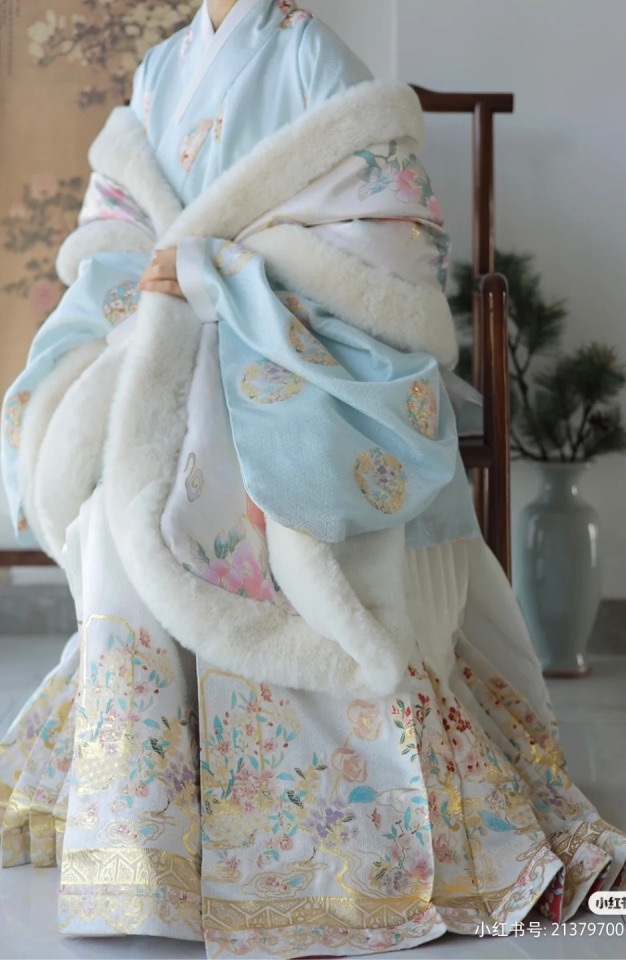
caiying dresses more for comfort on the day to day, preferring outfits that would keep her snug and comfortable. she might not always wear such big or long silhouettes like the one pictured above and would lean more towards something that takes up a little less space.
i also want to note that caiying doesn't dress primarily in any dark or super rich colours. her colour selection is usually soft, pastel colours. they're meant to give off the impression that she's quiet, elegant and simple. while her outfit might utilize some form of embroidery or patterns, they won't be over done or anything incredibly extravagant. this also goes just as much for any accessories and makeup -- less is more. at most, there might be a sort of bright lip shade she wears, but other than that, the arrangement of anything extra is subtle, taking advantage of natural characteristics and practiced mannerisms. the rest of her family tends to dress somewhat bold to match their status, so in comparison this makes her appear more simple yet stand out without leaning towards extravagance ( which she isn't particularly inclined towards anyway ).
credits to tumblr user shangyangjunzhu for using their lovely gifs for this meta of mine. they make really great content so pls give them a look !
semi-formal: we're getting into it a bit more now girlies (genderless). we're seeing more embroidery and details but still sticking more or less to the colour scheme of the daily wear with some inclusion of bolder colours here and there. types of outfits she'd wear to a more casual outing with friends / clients or to attend something like an opera show. it uses all the same principles discussed previously in the first section, including the reasoning behind the colours and etc.



formal - power dressing: now we are fucking it up seeing an incorporation of those previously unused dark, rich colours. these are the outfits that you would see used during events like banquets or other events like the lantern rite. her wardrobe utilizes styles influenced by the song and qing dynasty to really ( if she shows collar bone then she means some business afjslkfds ). these dark colours and more intricate designs are meant to feel imposing; she's demonstrating some level of status or authority. in certain scenarios, she may just switch to this style of dress for long periods of time like if she were on a diplomatic mission or became the head of the yang family ( maybe i'm foreshadowing who knows hahaha anyway -- ).
of course the accessories get an upgrade as well. you'll see more elaborate usage of jewels and metals, particularly gold. make up becomes more bold without going over the top. the darker shades make her more mature and more powerful in appearance while keeping it polished. the head pieces made of pearls and what not are going ON. the pearl make up that she keeps bringing back into style despite it being an old fashion statement (bottom left pic in the final row) goes on if she's really dressing to impress. she will stay up in the late hours of the night stitching in every thread of the most elaborate embroidery for these outfits.
she knows how to dress.
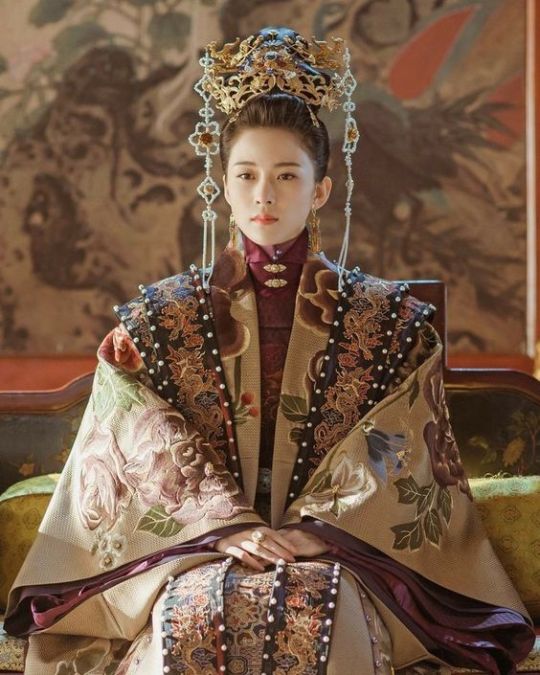


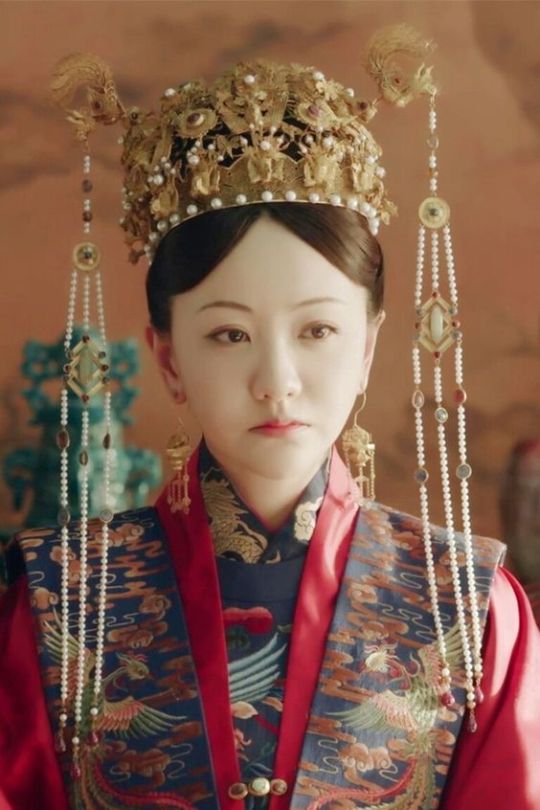

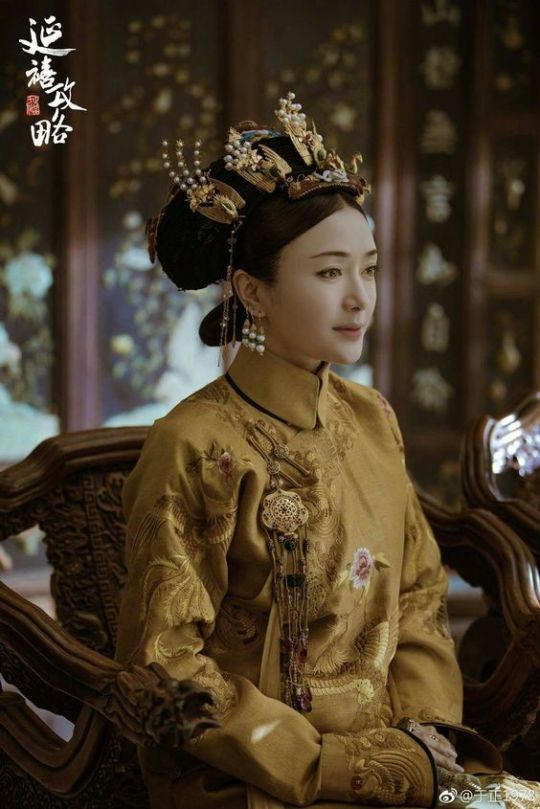

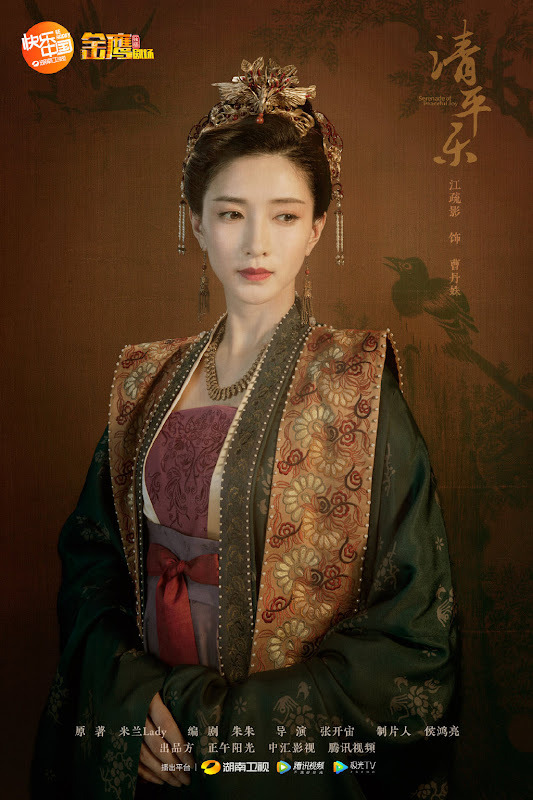



2 notes
·
View notes
Text
i think it’s so funny that gongdou dramas set in the qing dynasty try to convince us into believing princesses were actually treated well. like both legend of ruyi and the story of yanxi palace have qianlong be so attached to his daughters (well yanxi gong conveniently deletes every princess that’s not yingluo’s daughter), when most qing dynasty princesses never survived infancy and few actually lived past the age of 30. if anything the instance of yongzheng marrying off his youngest sister to the old dzungar geezer is actually more accurate. i am not gonna say the emperors did not love their daughters and were not attached to them because obviously historically qianlong was very attached to hejing and hexiao, and kangxi had many daughters he was very attached to. even jiaqing conferred posthumous titles upon some of his daughters who passed away in their late childhood (which says a lot because princesses were rarely given titles before being married off and none of these girls were old enough to get married). and i actually personally love seeing them on screen being represented, but i find it hilarious that the gross neglect they were shown is never talked about.
#qing dynasty meta#infant mortality was so high for royal offspring during the qing dynasty that it's appalling
33 notes
·
View notes
Photo
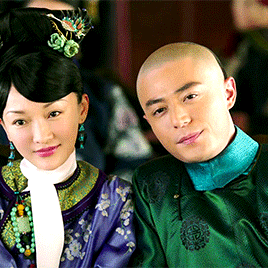
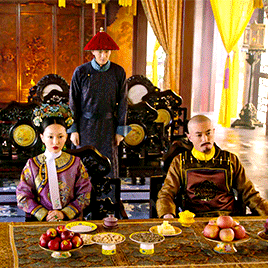
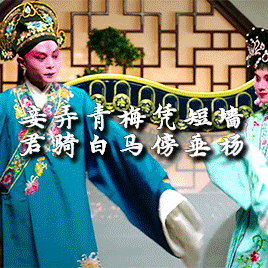
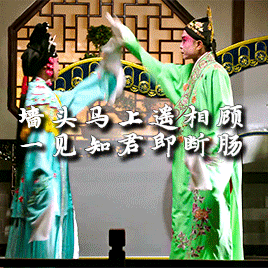
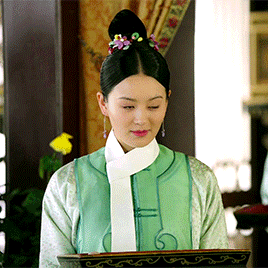
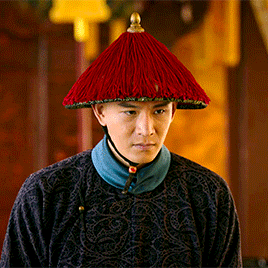
Guzhuang Appreciation Month: badass dialogues
(but in the novel)
legend of ruyi :: ep 5 // ep 78
This drama is so amazing, demonstrated by these two scenes. Here you have Ruyi and Hongli watching the same play at two different stages in their lives. In episode 5, they are still clearly in love and are happy watching the play together, leaning lovingly against each other and moving in unison as one. They are also being watched fondly by Aruo, who has yet to have ideas of betraying Ruyi. Many years later, in episode 78, we have Ruyi and Hongli watching the same play, but they are physically far apart and their emotional distance from each other is also clear on their faces. They are literally being divided by the presence of Ling Yunche standing between them.
I find the parallel between the closeups of Aruo and Ling Yunche the most heartbreaking, because Aruo, despite how happy she looks for them in ep 5, would eventually try to break Ruyi and Hongli apart. And yet for all her efforts, she never succeeds because Hongli never actually believes her. On the other hand, Ling Yunche never tries to get in between Ruyi and Hongli, but just the mere presence of him is enough for Hongli to drive a wedge between himself and Ruyi. The presence of Aruo and Ling Yunche in this scene drives home the stark contrast in how the relationship has deteriorated between Ruyi and Hongli, and how Hongli went from trusting Ruyi despite all evidence against her to believing the worst of her despite no real evidence.
What is even more heartbreaking is the play they are watching. It’s not made very clear in the drama, but the plot of the play has great significance in the novel. The play they are watching is called 墙头马上 / Over the Wall and Atop a Horse. The play is based on the poem 井底引银瓶 Silver Vase at the Bottom of the Well by Bai Juyi.
The poem by Bai Juyi, writes of a broken relationship/friendship where two people once lived happily in harmony, then one person wronged the other, causing the other person to leave and never come back; the relationship is thus severed.
When the poem was adapted into the play 墙头马上 / Over the Wall and Atop a Horse, the play tells the story of Pei Shaojun falling in love at first sight with Li Qianjin when she was standing by a wall and he was on a horse riding by her house. The two then eloped, and lived together for seven years, having two children together, before they were discovered by Pei Shaojun’s father. Upon the discovery, Li Qianjin was condemned for getting into a clandestine relationship and Pei Shaojun caved to parental pressure and divorced her. She went back to her hometown. Many years later, after having achieved political success, Pei Shaojun went looking for Li Qianjin again, and just happened to discover that the two of them were actually engaged as children. In the play, they then reunited, got remarried and lived happily ever after.
There is however a plot point in the Ruyi novel, where Qingying does not like the ending of the play, feeling that the happy ending was forced. In the novel, Hongli and Qingying only know each other in passing at first. Then on the day that Hongli chooses his wives, Qingying is made to attend by her aunt. Before the selection ceremony, everyone is invited to watch a play, and Hongli chooses Over the Wall and Atop a Horse. Qingying, because she dislikes the happy ending, asks the theatre troupe to change the ending of the play so that in the end, Li Qianjin does not actually get back together with Pei Shaojun but stays firm in her resolve to end the relationship between them. After the play ends, Qingying leaves before the selection, but Hongli becomes intrigued by her changed ending and chases after her. This conversation below ensues, in which you can see clearly how Qingying’s belief on the matter stayed constant with her through the years. In fact, she practically predicts her own fate later with her changed ending.
~*~
Qingying stepped lightly ahead, her gown fluttering in the breeze like a white butterfly in flight. Aruo’s face was robbed of all colour and she was crying in despair. “Gege, what is wrong with you? Everything was well, why did you change the ending of the play? If Huang Hou Niang Niang hears about it, what will you do?”
Qingying shrugged. “At most, Aunt will just scold me a little. I just don’t like that ending. Today, I finally got to see how it should be played out. I’m so happy!”
“Gege might be happy,” Aruo said miserably, “but today is the consort selection. If Gege you are not chosen, then what would we do?”
Qingying’s aunt had already intended her to be the Third Prince’s bride, and now that was not successful, she should be pushed to the Fourth Prince instead? If they needed this one forced marriage to prolong their family’s glory, would that mean all women of the Ulanara clan were little better than slaves? It would be better this way. Regardless of whether she succeeded at being chosen to be a prince’s consort or not, she got to see things done her way, for once.
She only managed a few steps more when suddenly a voice called behind her. “Qingying Meimei!”
No one had ever called her that before. Everyone in the palace simply called her “Qingying Gege”. Curious, she turned her head to find that Hongli was chasing after her.
Thinking that he must wish to reprimand her, Qingying made herself as small as possible.
Hongli only laughed. “I chased after you to comfort you. Xiyue Gege was rude in speech, I feared that you would be offended.”
“Offended? About what?” Qingying asked in a low voice. “Fourth Prince, do you mean to mention the fact that I was rejected by the Third Prince?”
Hongli nodded, frowning. “I only fear such talk will destroy your reputation.”
Qingying laughed, all her teeth showing, against all rules of decorum, which seemed to astonish Hongli.
“I don’t care!” she declared. “There are many things that women can’t necessarily decide for themselves, such as marriage, or family. But at least, I can decide whether to mind those mocking talks, whether to care about them and let them hurt me.”
Hongli looked sad for a moment, whispering, “Your family…” But then he trailed off. Then, with a humourless smile, he said, “Over the Wall and Atop a Horse is the play I chose myself, why did you not like the ending and asked them to change it? I pick a plum blossom, lean against the wall. / You ride off among the bending poplars*. Is that not a lovely image?”
“Yes, it is very nice, it’s just…” Qingying thought a moment then said, “Over the wall and atop a horse we gaze at each other. / I know you, too, must be heartbroken*. From this beginning, the play is full of conflicts, ups and downs, all very compelling, yet in the end, there is a forced happy ending, everyone is forced to be happy, I really don’t like it at all.”
[* excerpts from the poem by Bai Juyi]
Hongli looked displeased, asking, “To be able to mend a broken mirror, husband and wife reunited and at peace again, is that not good?”
“When Li Qianjin was being insulted by Pei Shaojun’s parents, he did not protect her. He watched her leave in humiliation and did not stop her, as if all the love and years they shared did not matter. Such a heartless and weak man who dares not protect his woman, why would Li Qianjin want to get back together with him?”
Her voice was soft, but also full of conviction. Even though it went against Hongli’s beliefs, he wanted to keep her talking.
“To be reunited and together in harmony is the wishes of all families on earth. If Pei Shaojun is willing to start over, why would Li Qianjin not forgive him?”
“Why must a woman always forgive a man for his failings? Wouldn’t that teach the man that it doesn’t matter what hurt he causes? I don’t care, if he hurt her, she shouldn’t forgive him.”
“Women must be soft and gentle, and give into her husband. If she sacrifices a little, bears a little hurt feeling, they can be reunited, isn’t that happiness?”
“If she must be hurt, must sacrifice herself for this forced reunion, then it is already not a good marriage,” Qingying said stubbornly. “In my eyes, Li Qianjin is a woman who is willing to walk away, to severe the relationship, because all trust is gone.”
“If she walks away, wouldn’t that mean she spends the rest of her life alone? Everyone has their own difficult moments, if Li Qianjin is so stubborn, Pei Shaojun is put in a difficult position too.”
“Who isn’t in a difficult position?” Qingying asked. “If the woman can understand the man’s difficulties, can a man not understand a woman’s pain of being cast aside and humiliated?”
Hongli thought for a moment then laughed. “Qingying Meimei, you are much too unbending.”
Qingying merely nodded. “It’s better to live the rest of your life alone, rather than live to old age with someone who already betrayed you once. So it might be harmonious today, but if a conflict arises, what is to say Pei Shaojun will not just forsake Li Qianjin again? It is easy to change mountains**, that is the principle here.”
[** there is a Chinese saying that it is easier to change the course of rivers and shapes of mountains than to change the character of a person… aka old habits die hard but with more stakes.]
Hongli still did not agree with her logic. “Women should place obedience before all and be pliable. If she does not restrain herself and be more accepting for the greater good, then she would just suffer.”
“If one must accept being humiliated for a so-called happy ending, then I don’t want that kind of happy ending,” Qingying repeated.
“Then is Over the wall and atop a horse we gaze at each other so easily forgotten?” Hongli asked, astonished.
Qingyin turned and stared at Hongli. “If it is not easily forgotten, then why didn’t Pei Shaojun protect Li Qianjin? Hasn’t he too forgotten how they once loved each other when he cast her aside?”
Hongli could not argue against her, and finally admitted defeat. “Meimei, you really are something, I don’t know what else to say.”
Qingying laughed in delight.
“Meimei,” Hongli said, stepping closer to her, “you argued so animatedly, you must love Over the Wall and Atop a Horse. Why don’t we go back and hear the play again?”
Qingying hesitated, thinking that it would be a great loss of face if she were to return now. But Hongli was looking at her so earnestly, she found it hard to immediately refuse.
“I’ll go back first, and prepare good tea to wait for you.”
He said ‘wait’, as if he would not move the day along if she did not come. Her heart softened, and she suddenly stopped in her path.
…
[And then of course Qingying comes back to attend the selection. Hongli, who had originally intended to choose Langhua, changes his mind and chose Qingying to be his di fujin, but then Yongzheng interfered and put a stop to it… But the play is one massive foreshadowing plot device that doesn’t get explained much in the drama, but packs a punch when you read this scene.] -h
#legend of ruyi#如懿传#cdrama#perioddramaedit#cdramanet#cdramaedit#gifshistorical#guzhuangappreciation#gzh#ruyi zhuan#qing dynasty#perioddramasource#asiandramanet#onlyperioddramas#ruyi's royal love in the palace#meta#ruyi meta#ruyi novel#translation#parallel#//
221 notes
·
View notes
Text
Cultural Fashion: Cabbage Merchant’s Vest
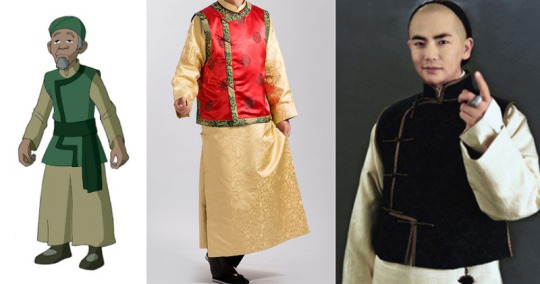
That’s right, Cabbage Merchant gets TWO outfit analyses cause I say so. The sleeveless jacket that the Cabbage Merchant wears resembles a magua (馬褂 / ᠣᠯᠪᠣ ), a Manchurian riding jacket that was popularized in China and other Asian countries during the Qing Dynasty (1644–1911). Its original purpose was to protect one’s robes from getting too dirty during horse riding and other laborious activities. The tangzhuang (唐裝), which is worn on its own, is considered to be a direct successor to the magua. Considering that Zuko and Sokka wear tangzhuang, it’s actually pretty fitting that the Cabbage Merchant wears what’s essentially the old-timey version of those shirts.
So, as far as meta details go, we’ve learned that the Cabbage Merchant...
Wears old man clothes.
Can ride a horse, probably.
Simple meta for a simple man.
Like what I’m doing? Tips always appreciated, never expected. ^_^
https://ko-fi.com/atlaculture
416 notes
·
View notes
Note
I don't know why I send it to you but op asked people to be gentle on their post and I don't think I can: I just read a "meta" about "polyamorous relationships in ancien China and how it affected the dynamics of mdzs" and I wanna cry at how bad it is. They're pulling numbers out of their ass to make assumptions: "let's say the 10% richest have, let's say, 3 wives" as if canon doesn't state that even JGS only has one (yes we could talk about his numerous mistresses but JGS is literally spider Georg in that regard), but that's not how meta works! You don't invents things to make a meta! And "playing devil's advocate" by saying "women are gold-diggers" to somehow absolve JGS of his crimes is probably one of, if not the worst take ever. Like, saying Meng Shi and the young lady Mo used JGS and deliberately became pregnant so they could get money/better situation out of him, it's gross and wrong, not even supported by canon. Don't know if you read that "meta", but anyway, I needed to vent, and I like your takes on things, you seems like a more astute and thoughtful person than some in this fandom.

Haaa, boy this one is a doozy... but I will attempt to explain myself why polyamory doesn't work well with MXTX's works in general, and for the political sphere of MDZS in particular. No, I have not come across this one, I am either blocked (lol), or I have my own tags filled up to avoid it all.
Within MDZS, the basis is that affairs or anything that is seen as the like, is a social faux pas. They are very upright and rigid in the ways of how traditional Confucianism regards life. Monogamy is rooted in the practice of marriage rights for it as the couple are to be presented as a united "hūn yīn/婚姻" in harmony for both families and society. The backbone of the work is heavily reliant upon Confucian rites and standards of life and not the fantastical more background of cultivation techniques. It was a significant event to wed and a major part of life to present in the Qing dynasty and was actually very grounded even with the selection of just what names potential wives had for the imperial line. Note the only ones allowed to have polyamory or harem, was the emperor of China and the imperial leaders.
It goes in so far that a major reason for divorce itself was due to incompatibility and lacking familial piety and any basis of grounds of being unable to divorce as such are, the wife has no other family, she observed filial piety of mourning a passed in law, or she married a poor husband who was now profitable (that united couple basis for making a living space).
Jin Guangshan in the eyes of a very heavily based Confucian world, is to be side-eyed and kept hush. The cultivation world of MDZS does not rely on the imperial rule, and as such seem to be considered part of the "normal society" and are of the expectation of one wife. Feudal lords, which the sects are not, have the one wife one consort rule. There is an entire system at place for political imperial lords for marriage and concubines. Guangshan's actions are a spur against social expectations and an embarrassment as to such why his illegitimate sons are pointed out as such and Madam Jin does not comment on his forays. He is not an imperial figure within the world and is only a cultivator who are at their basis supposed to embody Confucian teachings.
One point in each of the novels is that MXTX pokes fun at the horrors of concubine and harem lifestyles as being lonely cutthroat and cruel. Cause well, harem life in imperial China really sucked and was an antithesis to what confucian teachings were supposed to be. It is meant to point out the hypocrisy of Chinese harems of the royalty. And given, each of her protagonists are of the ideal of true confucian meanings "one husband one wife" is a big deal for each of her three leading couples.
#mdzs#mo dao zu shi#other mxtx novels sort of#needless to say mxtx works are not the boat to go on for polyamory to work realistically
51 notes
·
View notes
Text
Wen Zhou Flirty Poetry Moments Episode 4 - “such are the stars in the night sky”
This is uh… so romantic LOL
In Episode 4, Zhou Zi Shu and Chengling are sitting by the river when Wen Kexing and Ah Xiang joins them. When he arrives, Wen Kexing quotes this line, "如此星辰如此夜 (Rúcǐ xīngchén rúcǐ yè) (such are the stars in the night sky).
This was in the poem “Huai Huai” written by Huang Jing Ren (Qing Dynasty Poet). 绮, refers to an silk flower embroidery, which is subsequently taken to mean “beautiful”. 怀 means to “miss.” Jing Ren was in love with his cousin which did not end well, and hence, he wrote this poem. Therefore, the title can be taken to describe a type of beauty that arises from the despair of a love that is lost. (Lol Wen Kexing, you romantic nutcase lmao)
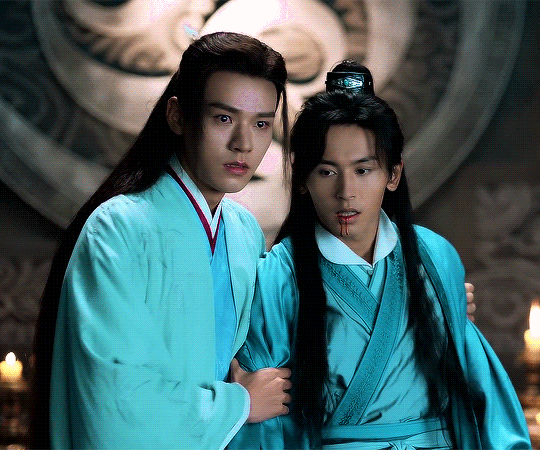
The entire poem is as follows:
几回花下坐吹箫,银汉红墙入望遥 (Jǐ huí huā xià zuò chuī xiāo, yínhàn hóng qiáng rù wàng yáo)
似此星辰非昨夜,为谁风露立中宵。(Shì cǐ xīngchén fēi zuóyè, wèi shéi fēng lù lì zhōng xiāo)
缠绵思尽抽残茧,宛转心伤剥后蕉。(Chánmián sī jǐn chōu cán jiǎn, wǎnzhuǎn xīn shāng bō hòu jiāo.)
三五年时三五月,可怜杯酒不曾消。(Sānwǔ nián shí sānwǔ yuè, kělián bēi jiǔ bùcéng xiāo.)
When translated:
I sit among the flowers and blow the Xiao. Although the red wall is close at hand, it is as far as the silver moon that lies in the sky.
The stars before us aren’t the stars of yesterday, for whom did I brave the winds for the whole night?
The lingering feelings are like that of a silkworm cocoon, the spinning heart is like a banana that’s stripped.
Reminiscing the beautiful scene when she was fifteen years old under the full moon night, I sigh as the wine in my hand cannot wash away the sorrow in my heart.

Wen Kexing loosely rephrases the second line of the poem (如此星辰如此夜 Rúcǐ xīngchén rúcǐ yè) which means "such are the stars in the night sky”. The romantic implication is pretty obvious in the second part of the second line, "for whom did I brave the winds for the whole night”. This foreshadows the later part of the episodes, where Wen Kexing stays up the whole night blowing the Xiao to heal Zhou Zishu’s injuries. (Omg boyfriend goals)
If you like my meta, please support me!
Resource: (1), (2), (3)
240 notes
·
View notes
Text
@sailormeowsblogs:
Why the game of thrones book tho....
Because it's really good?
(For reference, this is about my recommendation of Queenship and the Women of Westeros: Female Agency and Advice in Game of Thrones and A Song of Ice and Fire (2020), edited by Zita Eva Rohr and Lisa Benz.)
Essentially, it's a jumping-off point for scholars of queens and queenship to talk about their own topics through the lens of the books/show, which can be a great way for people familiar with the series to look at the history behind it. And certain chapters rip apart the ASOIAF series's treatment of its female characters on the basis of GRRM's supposed historic realism, which is always great to read. Here's the table of contents:
Part I Queenship
1. A Game of Thrones in China: The Case of Cixi, Empress Dowager of the Qing Dynasty (1835–1908) James J. Hudson
2. Queen of Sad Mischance: Medievalism, “Realism,” and the Case of Cersei Lannister Kavita Mudan Finn
3. Westerosi Queens: Medievalist Portrayal of Female Power and Authority in A Song of Ice and Fire Sylwia Borowska-Szerszun
4. “All I Ever Wanted Was to Fight for a Lord I Believed in. But the Good Lords Are Dead and the Rest Are Monsters”: Brienne of Tarth, Jaime Lannister, and the Chivalric “Other” Iain A. MacInnes
Part II Female Agency
5. The Peaceweavers of Winterfell Kris Swank
6. Cersei Lannister, Regal Commissions, and the Alchemists in Game of Thrones and A Song of Ice and Fire Curtis Runstedler
7. ‘All Men Must Die, but We Are Not Men’: Eastern Faith and Feminine Power in A Song of Ice and Fire and HBO’s Game of Thrones Mikayla Hunter
8. Daenerys the Unready: Advice and Ruling in Meereen Shiloh Carroll
Part III The Role of Advice
9. The Royal Minorities of Game of Thrones Charles E. Beem
10. Wicked Women and the Iron Throne: The Twofold Tragedy of Witches as Advisors in Game of Thrones Sheilagh Ilona O’Brien
11. Afterword: Playing, Winning, and Losing the Game of Thrones—Reflections on Female Succession in George R.R. Martin’s A Song of Ice and Fire and Game of Thrones in Comparison to the Premodern Era Elena Woodacre
For instance, Kavita Mudan Finn's chapter points out the fact that in writing Cersei, GRRM basically takes all of the misogynistic descriptions of Margaret of Anjou and other "bad queens" at face value and combines them into one person, as does Sylwia Borowska-Szerszun's (although the latter also looks more generally at the parallels between different characters and historical queens). Kris Swank looks at the early English tradition of queens as "peaceweavers" and applies it to Catelyn, as well as other stereotypes of the same period. Shiloh Carroll is kinder to GRRM and mainly tears apart the character assassination done to Daenerys on the show.
Some chapters also cite meta on Tumblr, which is pretty cool to see.
This attitude better reflects the failings of nineteenth- and early twentieth-century medievalism than the actual history, as many contemporary medievalists have discussed at length. As Shiloh Carroll argues, building on the work of Helen Young, “readers are caught in a ‘feedback loop’ in which Martin’s work helps to create a neomedieval idea of the Middle Ages, which then becomes their idea of what the Middle Ages ‘really’ looked like, which is then used to defend Martin’s work as ‘realistic’ because it matches their idea of the real Middle Ages.”
(This quote is citing Carroll in Medievalism in A Song of Ice and Fire and Game of Thrones, also a good bridge for the current or former ASOIAF fan.)
7 notes
·
View notes
Text
Wei Wuxian and Chinese Virtues of 忠孝仁义
There’s a lot of conversation about Wei Wuxian and how he struck out on his path without a concern for the Jiangs; about how he’s reckless and not giving a sh*t about his role within his society; about how he had a family and siblings and threw it all away for his sense of right and wrong. But the way I read his actions is within the context of the virtues of 忠孝仁义 (and how the virtues, especially 义, is ingrained in him via the Jiang sect motto). WWX’s major decisions can all be read as him acting in accordance with one or more of these virtues. Even when WWX is being his most irreverent self (and yes he’s rude and bring about a lot of second hand shame) he still remembers the we-self (to borrow from baoshan-sanren’s post) context as the head disciple of the Jiang Sect. Even when he seems to abandon everything, he didn’t abandon his understanding of these virtues.
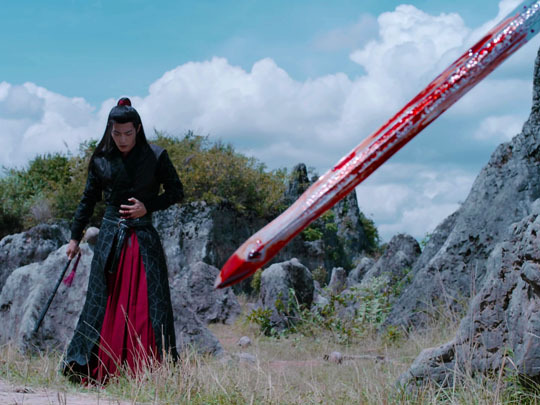
First of all, let’s talk about 忠. 忠 (zhōng) is loyalty, devotion, fidelity. I usually associate the concept with loyalty towards your country but it can be applied to other units too. In the case of CQL where we don’t see an Emperor or country, it would only make sense that this concept be applied to either a person (e.g. SuShe at JGY) or a sect.
Tangent, feel free to skip: An (maybe THE) embodiment of this virtue is 岳飞 (Yue Fei), one of THE MOST famous Chinese generals. Yue Fei lived during the second half of the Song dynasty. He loved his country so much, he wrote poetry about drinking his enemy’s blood and eating their flesh (壮志饥餐胡虏肉,笑谈渴饮匈奴血) and taking back his country’s lands and saving the two previous emperors from being POWs. He is famous for the tattoo of the words “尽忠报国” (exhausting all loyalties to replay country aka i will be loyal and fight for my country until i die) on his back bestowed by his mother before he left home. When he was unjustly executed for treason, the executioners saw that on his back and the people knew a great man was wronged.
(if anyone wants a translation of the poem and a rambly share about some of my favorite Yue Fei related facts/stories, let me know. Otherwise, i’m gonna get back to our favorite necromancer)
So back to WWX. His loyalties are very much with the Jiang sect. After JFM and YZY dies, within the structure of 忠, Jiang Cheng is effectively who he needs to be loyal to because Jiang Cheng is the sect leader and essentially the symbol of the sect. The act of giving up his core to JC, then, embodies the idea of loyalty within the context of 忠. (I’ve seen memes about how WWX gave consent, WQ gave consent, but JC didn’t. drwcn has a great post about consent. For this post, i’m not going to go into it because this is outside my defined scope.) Furthermore, 忠 compels WWX to protect the Jiangs. I’ve read meta that thinks WWX was trying to get himself killed based on the crossing of his hanfu and his mouthing off at Wen Chao. I’m inclined to believe that reading because if dying means JC would never find out, so be it. And as long as WWX is dead, there will be no evidence of the core transfer so JC would never lose face before other cultivators. It would mean the Jiang sect can be rebuilt to its old status without being tainted by WWX’s sacrifice.
Ok, next is 孝. 孝 (xiào) is most often translated as filial piety. I don’t think there is a good sense of it in western culture. In chinese culture, it is the expected deference younger generations need to display to elders in their direct lineage. [Note: i use lineage because you can be 孝 towards your biological parents and grandparents, your kungfu master and their master, your adopted/honor bound parents, etc but not to everyone who is in a higher generation. It’s very family/lineage based.] 孝 is complicated because it’s ingrained into Chinese kids at a really young age. Go pour your grandparents tea. Go give your grandparents a back rub. Listen to your parents. When your parents get old, you’ll take care of them. Respect your elders. Even if your elders are wrong, don’t talk back. It’s a set of emotions that tie you to your ancestry. To turn your back on it feels like turning your back on your culture and identity.
Tangent, feel free to skip: Ok, this is really cool and I had to share. In looking up 孝 in the online xinhua dictionary, it says about the etymology: “形声。从老省,从子。” This is so cool! We have two characters: 老 (old, as in Yiling Laozu) and 子 (child). You’ll notice 孝 is a character where to top part of 老 is taken and 子 essentially follows. This character is a style of character where the meaning comes from the structure of the character. So 孝 is where the children follow the old, often blindly and with disregard of their own needs.
WWX, as an orphan, can only direct his 孝 towards Jiang Fengmian and Yu Ziyuan. 1) No matter how awful they were as parents, JFM and YZY raised WWX. 2) WWX is the head disciple. That means JFM is his shifu. [He calls JC his shidi and JYL his shijie for that reason.] That teacher-disciple relation is often described as “一日为师,终生为父” (a teacher for one day should be treated like a father for life). Both 1 and 2 bind WWX to the Jiangs regardless of his adoption status. So, when on the boat YZY and JFM tell WWX to take care of JC and JYL, it’s the order of an elder in his direct lineage. To not listen, to not defer to that order would not be 孝. Considering they perished at Lotus Pier, WWX was obligated to execute those orders to their fullest whatever the price (i.e. golden core).

Along those same lines, out of 孝 (and human decency, tbh) WWX and JC had to retrieve JFM and YZY’s bodies. Wen Ning helping them out in that situation is a HUGE favor. Not to mention all the other things WN and Wen Qing does for them. I will get to the favors and their ramifications later.
Ok, moving on to 仁. 仁 (rén) is most often translated as benevolence or humanity. (I want to say I find the translation of humanity very interesting from a bilingual child’s perspective because the chinese character for person/human is 人 which is also rén. I got the concept confused a LOT.) 仁 is found in the love and kindness shown towards fellow humans. Ctext often translates it as virtue, which is a bit too broad, IMO. I think this line from Confucian Analects explain the concept succinctly:
樊遲問仁。子曰:”愛人”
Fan Chi asked about benevolence [仁]. Confucius said, "It is to love all men."
WWX embodies this love better than everyone else in the story (except maybe LSZ but LSZ probably gets it from WWX). WWX meets stuttering WN and acknowledges him, offers to give advice, and truly sees the younger man. He treats WN with kindness and friendship (and yes, he takes advantage of WN’s willingness to push him around in a turnip wagon but that’s more shenanigans). WWX also sees the Wens at Phoenix Mountain as human and steps out of line to help them. His blindfolded five arrow show stems out of his 仁. His saving Mianmian is also an expression of his 仁. So many of WWX’s actions stem from 仁. A lot of the fandom see it as his empathy and I agree! It is that! But it can also be viewed as his internalization of the virtue to love humanity.
Finally, 义. 义 (義,yì) is actually the reason this ENTIRE post came to be. 义 is the same 义 as Yi City. I offer the traditional version of the character above so you can see how it compares to the stone on the way to Yi City. You will recall when WWX says Yi City, LWJ asks, “Yi, which means chivalrous?” And WWX explains same character but for coffin/mortuary in this case.
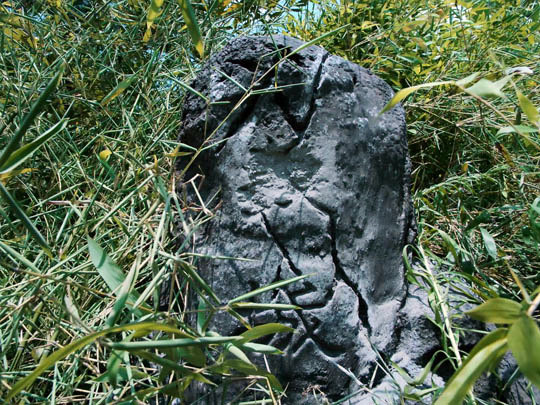
Actually, 义 is used in a lot of words:
正义- correct/rigit + 义 = righteousness
意义 - ideal + 义 = meaning
侠义 - knight -errant + 义 = chivalry
义气 - 义 + air = personal loyalty; code of brotherhood
名义- name + 义 = nominal
义父 - 义 + father = sworn father (this is a difficult to translate idea that sometimes i translate as godfather for simplification and cultural parallelism. it’s a parent figure that you acknowledge via vows. If the character for father is replaced with brother, then it’s the relationship that the 3zun have. And OMG i want to talk about the 3zun and romance of 3 kingdoms and how much of a awful un-义 person JGY is… but also holy out of scope batman)
In the case of virtues/morality, we’re looking at 义气 - the 义 that means loyalty to people and a code of brotherhood. The Jiang Sect ancestor is described as a 游侠 (yóu xiá, wandering hero). The ancestor’s identity as a 侠 (xiá), which indicates a highly skilled martial artist/fighter who will defends others (à la wuXIA and xianXIA), places him within the world of 江湖 (jiāng hú, sometimes translated as rivers and lakes or “pugilistic world” in some wuxia subtitles). In 江湖, 义 is the most important virtue. Based on 义, you help those in need. You stand out and do what is right. You are an outlaw that follows a strict moral code. 义 is the foundation of the Jiang Sect’s motto. Furthermore, the idea of 义气 can in some ways be viewed as currency. You do me a favor, I owe you one. You treat me with decency, I return the favor. You DO NOT return kindness with ill intent. It is taboo.
WWX exemplifies 义. 义 is part of what makes him so lovable and reckless. For 义 , he sticks out his neck for LWJ during Wen Summer Camp. For 义, he follows LWJ to search for the Yin Iron. Under 义 , he is free to be the hero who lends a hand whenever it’s needed. Oftentimes, 仁 and 义 go hand in hand because to stand up and stand out for other requires love of others and seeing their humanity.
So let’s get back to the Wen remnants: for 义, WWX must protect WN and WQ. As I mentioned before, WN and WQ had done WWX and JC (and thus the Jiang Sect as a whole) MULTIPLE HUGE FAVORS. 1) saving JC from Wen Chao at Lotus Pier. 2) retrieving JFM and YZY’s bodies. 3) transferring the golden core against WQ’s best judgement. All of these actions are so vital to the survival or the reputation of the Jiang Sect. WWX knows it. I’m positive JC knows it. To turn their backs on WN and WQ would be 不仁不义 (neither 仁 nor 义). Really, the ONLY thing they should be doing from the perspective of 义 is helping the Wens to repay their kindness. But WWX knows, as the head disciple, that JC cannot afford to align the Jiang Sect in sympathy with the Wens because it’s political suicide. The Jiang Sect WILL NOT SURVIVE if Nie, Jin, and Lan all turn against them. Even if Lan stood neutral, Nie and Jin would still be able to wipe out barely rebuilt Jiang.
So what does WWX do? He has already painted himself as a rebel, as rude, as ill bred. And from an outsider looking in, WWX is in alignment with his slippery descend into darkness. WWX knows if he steps just a little more out of line, he can accomplish everything else his morality dictates. (We could talk about WHY WWX feels like it’s ok for him to give up everything and analyze WWX’s self worth and what not. But that’s also outside the scope of this post and i’m pretty sure other people have done a better job of it than I could.)
Save the Wens, run away to the Burial Mounds, and defecting are all aligned with WWX’s morals. Defecting protects JC and the Jiangs sect in an act of loyalty (忠). Defecting also protects JC and JYL, thus fulfilling the filial piety toward YZY and JFM’s instructions (孝). Saving the Wens returns the debt of 义 that JC and WWX owe to WN and WQ. Saving the Wens also appeal to WWX’s sense of 仁 towards the non-cultivators. Lastly, protecting the Wens means JC does not end up 不仁不义. From WWX’s perspective his actions are the only option for him to really have no regrets when he asks his heart.
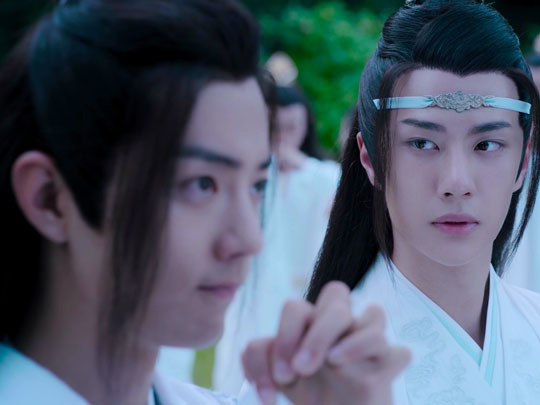
#LONG post#meta#jiang cheng#wen qing#wen ning#my meta#character analysis#江氏家训#江澄#江晚吟#魏婴#魏无羡#wei wuxian#yunmeng jiang sect motto#tw: blood#the untamed 陈情令#陈情令#cql#mdzs#魔道祖师#i swore i tries to keep the scope narrow#i just want people to see what i see he's doing because it hurts so much#and i feel so bad for him#i am trying not to place judgement here#忠孝仁义#温情#温宁#jiang fengmian#yu ziyuan
790 notes
·
View notes
Text
Spy Thriller + Murder Mystery + Cooking Show
When asked to describe The Sleuth of the Ming Dynasty, I can only describe its genre as being exactly as above. it’s as quirky as you’d expect, with genuinely compelling characters, plot twists to shock you, and compassion for every character, no matter how twisted.
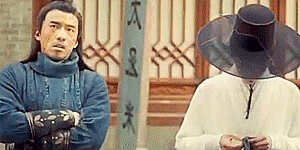
I believe TSOMD is based on a danmei novel, and you can see the “bromance” of Tang Fan and Sui Zhou is representative of something more than “just friends.” But, while both Tang Fan and Sui Zhou are excellent characters who each get strong development, the emotional core of the show is hardly either of them. Instead, the third main character, Wang Zhi (based on a real historical figure), steals the show’s heart and soul, undergoing one of the most beautiful, complex arcs I’ve seen in a long time, from scheming utilitarian to kind human.
I’ll probably write a meta just about Wang Zhi’s arc, but the short version is that he’s based on a real-life eunuch (and eunuchs in imperial China, er, lost more than you’d think) who de facto ran the empire. His interactions with Tang Fan, Sui Zhou, their found family, as well as with the Emperor and the Noble Consort (his unofficial adopted parents) and his righthand man Ding Rong all offer him challenges.

In general, the show did excellently with the romances, both explicit and subtextual. Tang Fan and Sui Zhou were truly compelling, and seeing them develop together was lovely. Wang Zhi also has a subtextual romance with Ding Rong (it’s barely subtext, and directly parallel to Tang Fan/Sui Zhou multiple times) that is equally compelling. Explicitly, we have Pei Huai and Tang Yu, Lin Chaodong and his fiancee, Princess Gu’an and Wang Xian, the Emperor and Noble Consort, and even some puppy love from Dong’Er and Little Loach. Perhaps the only one the show didn’t sell me on was Duo’Erla and A’lasi.
I quite enjoyed the compassion the show had for mental illnesses and other disorders. It outright condemned people accusing those who suffer from ailments of demonic possession, and while it is set in the 1500s, Pei Huai, a doctor, offers some truly honest, accurate, and kind descriptions of post-traumatic stress disorder, which Sui Zhou suffers from, and autism, which Wang Xian has--and explicitly states, regarding the latter, that it is not an illness. It’s just a different way of thinking and processing. The show’s depiction of PTSD was extremely honest and realistic (and not gratuitous), as was its depiction of autism, and a panic attack.
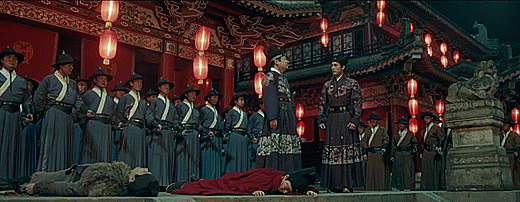
The show also donates quite a bit of its time to exploring the past of its villains, humanizing them. Even the most disgusting ones, whom I loathed, I ended up crying for. It doesn’t excuse them, but it does show how human they still are at their core--and this, in turn, ties into the show’s main theme of humanity (Wang Zhi’s arc is entirely about learning to live as a full human). It offers redemption for many of them; some take it, some do not.
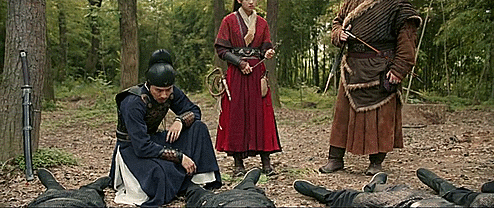
Female characters abound, and they are all unique and complex. From the child genius Dong’Er to the proper mother Tang Yu, to prostitute Qing Ge to disguised Jin San, to the kind and capricious Princess Gu’an and the fiesty Duo’Erla, the Emperor’s Mother to the Noble Consort, each character is unique and does not only exist to serve the male characters in the story: instead, they have their own to tell.
However, I’d be remiss not to mention my issues as well. One prominent female character very much gets fridged at the end of her arc for manpain, and it’s incredibly frustrating. In addition, I was highly uncomfortable with what could be seen as racism towards the Oirat people. While there are a variety of Oirat characters and many are heroic, there was a balance the show tried to walk and didn’t entirely succeed. China’s record on treatment of minority people groups (which continues to this day with the Uygurs) makes it hard to give the show the benefit of the doubt in its iffy moments of Oirat portrayal.
128 notes
·
View notes
Text
sometimes i wonder about the loss of personal names for qing dynasty empresses; for many empresses of han dynasties personal names weren’t recorded and very few (but extremely prominent) names remained. it can be seen that during the early qing period personal names were recorded not only for empresses, but royal consorts, princesses and for all the difujin as well; slowly towards the shunzhi era it decreases and disappears completely during the kangxi era (we have the personal name of xiaojingxian, yongzheng’s empress and then the next time we get a personal name is during the xianfeng emperor’s reign)
18 notes
·
View notes
Photo



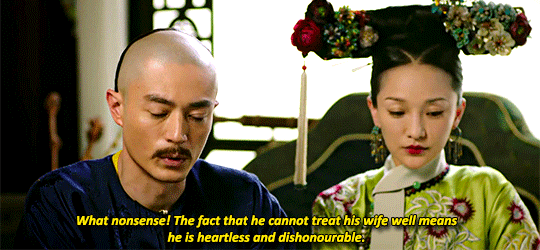
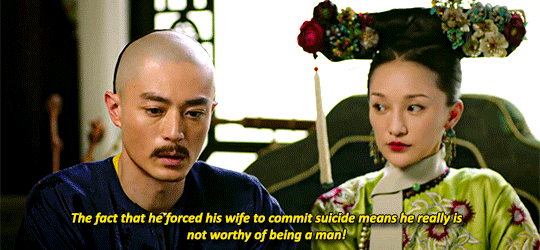
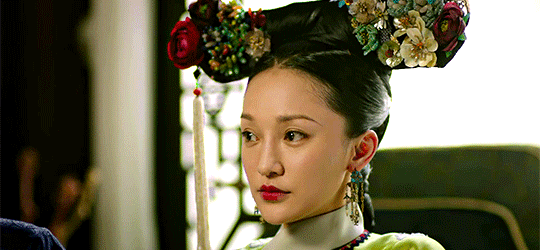
Legend of Ruyi
Oh wow the dramatic irony is strong in this scene.
I mean, by this point both Langhua and Xiyue have died in both physical and emotional agony due to the callous way Qianlong treated them, so it’s also...did you seriously just say that with no sense of self-awareness whatsoever?
I find these scenes in the middle of the drama very interesting to rewatch. On the one hand, this is the pinnacle of their relationship where they probably are most in sync and on equal footing. On the other hand, Ruyi also has been disappointed by him already so she doesn’t have that same young naive total trust in him anymore. However, there is still probably a part of her that wants to believe that he loves her as much as it is possible for an emperor to love anyone and she can still make it work. Then she would come up against the moments when he says things like this and just has to sort of push past them for her own sanity probably.
#如懿传#legend of ruyi#cdrama#perioddramaedit#cdramanet#cdramaedit#gifshistorical#gzh#ruyi zhuan#qing dynasty#ruyi meta#meta
160 notes
·
View notes
Note
Do you have any cdrama suggestions for a baby beginner? I think Empress of China is the most famous one I’ve heard of but I’m curious about others too!
B-baby beginner? No, my friend, when it comes to cdrama, we simply throw you into the pit…
Just kidding! Although, for a myriad of reasons, being a Chinese drama fan outside of Asia without a hold of the language is admittedly rather difficult (so to the “international” cdrama fandom: you guys rock!).
Unfortunately, your answer did not really help me narrow down my answer after all. I believe Moonlight Drawn By Clouds, your recent fave, is very romance-centric, but I feel like everyone tends to vacillate in their mood, preferring super romantic escapism one minute and demanding tight storytelling the next. Anyway, I’ll stop rambling and actually get to the point:
personal recs, in general*
I just couldn’t really “categorize” these?
peace hotel (2018): currently in the midst of watching this still, but I’m really enjoying this! honestly. especially with how the female chars (most of the chars are written.) it’s this mix between super suspenseful espionage and really cathartic humor. the plot twists are also so !!!!!!!!!!!!!!!!
let’s shake it! (2017): alien crashlands to the tang dynasty! it’s super cute and quirky, but there’s also a strong, coherent plot and some angst in the latter parts. definitely one of my faves of last year, though it’s punny sense of humor doesn’t always get through. it’s also very appreciatively meta ;) the subs apparently aren’t complete, as my friend complained to me, but I personally find the language real simple
medical examiner dr. qin (2016): the interactions between the crime-solving trio are gold. also, like the only modern show here?? (as you can tell, I am really mostly a period show watcher.)
go princess go (2015-16): it’s really low-budget and cracky, but trust me, there’s a reason it went viral. zhang tian ai does feel like the saving grace a lot of the time though, and I didn’t exactly give it a high score, but it just might be your thing. who knows?
nirvana in fire (2015): i don’t think it’s the best c-drama ever, unlike a lot of people on this site, but it’s still a very solid show. I also find it a lot more shoujo than most fans—it’s really not just a revenge-political drama—but when it was emotionally gripping, boy, it was emotionally gripping.
wuxin: the monster killer (2015): technically only season 1—I have yet to see s2—but weirdly enough, I found the poignant ending especially fitting. just assume from the title? yue qiluo is one of the more interesting villains out there, and gosh I just adore yueya so much
bu bu jing xin (2011): extremely poignant, complex look into polymagy/patriarchy during the qing dynasty from the lens of time-traveller zhang xiao who takes the identity of court lady ruoxi. even if you don’t ship any of the romances, it is so worth it for pretty much everything else. but if you do, obviously also an extremely heart-wrenching watch. a lot of people’s first cdrama.
schemes of a beauty (2010): lots of spying, secret chambers, poison, women control the men.
*I would want to recommend The Legend of Zhen Huan and The Glory Of Tang Dynasty, but they’re 76 episodes and 92 episodes long, respectively. Content-wise, it’s also stuff that requires lots of trigger warnings, and overall just not for the “baby beginner”. Battle of Changsha is definitely shorter, and a definite recommendation, but also just not for the “baby beginner.”
no dubbing
(Peace Hotel, Battle of Changsha, NiF, Medical Examiner Dr. Qin)
the advisors’ alliance (2017) + growling tiger, roaring dragon (2017-18): a mix of no dubbing and some dubbing. it’s a pretty creative to take the viewpoint of sima yi in this three kingdoms historical piece. I feel that it’s rather accessible to viewers, honestly, and the production values are great on this one.
nothing gold can stay (2017): only 4 eps in—it’s very solid so far (74 eps though, but I would say quite mainstream and easy to watch)
ten miles of spring wind can’t compare to you (2017): do I really want to rec this though? in the end, I really did wish I had someone to vent about this to and discuss with about, because in a lot of ways this really did give lots of food for thought. let’s just say that our three main chars are deliberately rather fatally flawed…and I still feel rather ambivalent about how to feel about this. (the first 10-15 eps are super cute, meta, adorable but also with great sexual tension and then it sort of goes to melodrama but anyway…) you could at least practice your chinese? it is harder than the average modern cdrama, given how pretentious qiu shui can get
shoujo period romances
We all have a soft spot for these :’)
sound of the desert (2014): just yesterday, there was quite a lot of discourse on this show on my dash, interestingly. female lead xin yue (liu shi shi) is raised by a wolf pack, though she eventually enters the capital city sometime during the han dynasty. she does at first fall for a crippled, broody flute player played by hu ge (imo one of his more lackluster roles) but it’s her chemistry with HAWT general wei wuji (eddie peng
female prime minister/legend of lu zhen (2013): again, freakishly sizzling chemistry. it focuses more on lu zhen rising up the ranks as lower-level female ministers, but mostly still very very romance-centric. (the otp falling-out in the last 10 eps or so was kind of stupid, I will admit, and also 200% all on gao zhan but it had such a strong addictive quality to it.)
gong/jade palace lockheart (2011): I haven’t seen Boys Over Flowers/the Japanese original/any official remakes of whatever that is, but a lot of people have called it Boys Over Flowers + modern girl time travels to the Qing Dynasty + 9-prince succession conflict during Kangxi’s reign. it was rather stupid and petty at times, but it’s more comedic and the romance is super addicting. I don’t care about the half-bald Qing queues at all, and this is actually one of the only roles that I’ve found Feng Shaofeng attractive in. (yes, it is possible to love bbjx and enjoy this)
Oh yeah, and all these end all happily and fairytale-like. None of the above would qualify as my “faves” at all, but all are very accessible to someone unfamiliar with cdrama and love the Romance and the Pretty.
others (I found rather lackluster or dropped): Perfect Couple, The Eternal Love (very popular among international audiences, but not for me), General and I, Oh My General
wuxias/xianxias
This is just going to be an embarrassing amount of childhood nostalgia. Like, literally, with the exception of the first one, I watched all of these in elementary school, with varying amounts of rewatching in between. The recent wuxias and xianxias just haven’t been to my liking. (I could get into how NiF takes lots of wuxia elements but I would just confuse you a lot so, strictly on the more fantasy/action side of things here.) I simply haven’t watched Eternal Love/Ten Miles of Peach Blossoms (very, very popular) at all. I’m sorry.
vigilantes in masks/strange hero yi zhi mei (2011): I believe the international equivalent is “Iljimae”? It’s like Robin Hood, sort of, but mostly Liu Shi Shi’s Yan Sanniang is so amazing here.
chinese paladin 3 (2009)
return of the condor heroes (2006)
chinese paladin (2005)
lotus lantern (2005)
also 武林外传, which is 80 eps, but kind of more like a wuxia sitcom way back in the day. there’s in-show ppls, tons of modern references, etc. and also like lots of satire/social commentary. I did a rewatch (of brief clips ofc, I don’t have that much time) recently, and realized I missed so much when I watched it with the family back then. (I’m kind of embarrassed about the more lewd references…lol…)
*line break*
Whew! Anyway, the takeaway is, there is a lot of stuff to choose from, and I definitely left out a lot of stuff. There’s also a lot of modern cdramas. This answer might clarify about those shows.
(that being said, I really personally would not recommend empress of china. I mean, aside from 96 eps, just 2 eps in I could tell it was going to be an unsubstantial mess >_
162 notes
·
View notes